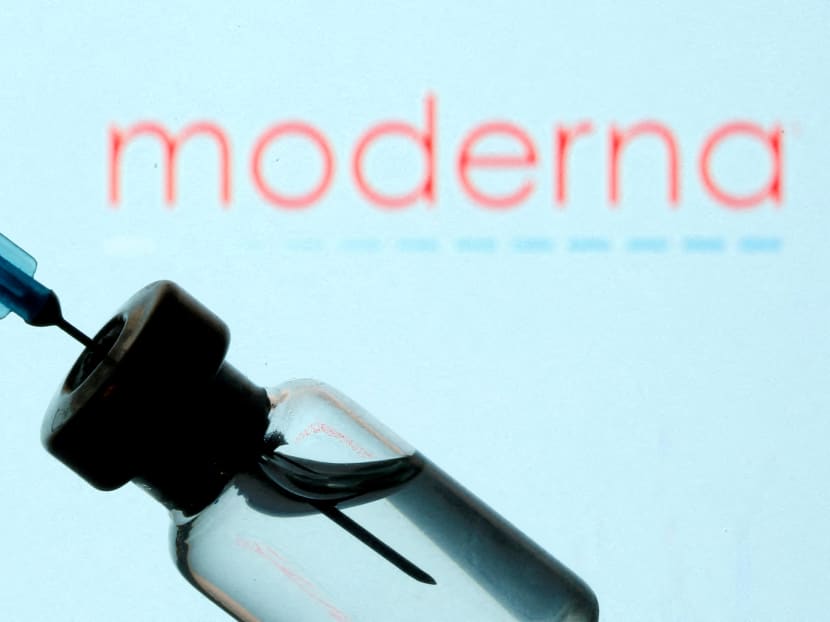Explainer: What are bivalent Covid-19 vaccines, who should get the updated booster?
SINGAPORE — The Health Sciences Authority (HSA) announced on Wednesday (Sept 14) that it has granted interim authorisation for Singapore’s bivalent Covid-19 booster vaccine.

- The new bivalent Covid-19 vaccines contain components from the original Covid-19 strain, as well as the Omicron subvariants
- They are manufactured by both Moderna and Pfizer/BioNTech
- Current vaccines largely target the original virus
- However, Health Minister Ong Ye Kung said they “remain highly protective against severe disease”, including for the Omicron BA.5 infections
SINGAPORE — The Health Sciences Authority (HSA) announced on Wednesday (Sept 14) that it has granted interim authorisation for Singapore’s bivalent Covid-19 booster vaccine.
The authorisation of the Spikevax Bivalent Original-Omicron Covid-19 vaccine by American pharmaceutical company Moderna came a day after Health Minister Ong Ye Kung told Parliament that HSA has completed the evaluation of Moderna’s bivalent vaccine.
Moderna, however, is not the only company to produce this new type of Covid-19 vaccine; its rival Pfizer-BioNTech has similarly created its own bivalent formulation.
But what exactly are bivalent vaccines and how do they differ from the ones that a majority of Singaporeans have already taken?
TODAY takes a closer look.
WHAT IS A BIVALENT VACCINE?
In short, the bivalent vaccines will “target both the ancestral strain of Covid-19 and the Omicron variant”, Mr Ong said on Tuesday.
The United States Food and Drug Administration (FDA) said that a bivalent Covid-19 vaccine contains two messenger ribonucleic acid (mRNA) components of the coronavirus — the original coronavirus that was first reported in the Chinese city of Wuhan and the Omicron subvariants.
Specifically, Moderna’s formula will target both the original Sars-CoV-2 virus and the BA.1 subvariant, the earliest version of Omicron.
As for Pfizer-BioNTech, its version targets the original virus as well the BA.4 and BA.5 Omicron subvariants.
The latter two subvariants contributed close to half of Singapore’s Covid-19 cases in late June.
Various media reports have previously stated that Pfizer-BioNTech’s bivalent vaccine would be for people aged 12 and older, while Moderna's would be for those 18 and older.
WHAT ABOUT CURRENT VACCINES?
The Covid-19 vaccines that are now being used largely target the original virus.
Nevertheless, Mr Ong said on Tuesday that they “remain highly protective against severe disease”, including for Omicron BA.5 infections.
“So if you are eligible to receive another vaccine dose, please receive your vaccination without delay and not wait for variant-specific vaccines, as Covid-19 is still spreading in the community,” he said then.
WHAT DOES THE DATA SAY?
On Wednesday, Singapore’s HSA said that it had reviewed the data from Moderna, which was based on trials conducted on individuals aged 18 and above.
The results showed that the bivalent booster vaccine elicited a strong immune response against the Omicron BA.1 variant, while preserving the immune response against the original Covid-19 strain.
Preliminary data also suggested that the vaccine may stimulate antibodies against Omicron BA.4 and BA. 5, as well as other variants such as Alpha, Beta, Delta and Gamma, HSA added.
“Hence, it could be reasonably expected that the bivalent booster vaccine can enhance the immunity against the Omicron variants, while maintaining the base protection conferred by the original vaccine,” the authority said.
News agency Reuters reported last month that Pfizer presented data on its BA.4 and BA.5 booster from studies in laboratories and animals.
The company said then that it generated a strong neutralising antibody response against those and other Omicron variants, as well as the original strain of the virus.
WHO SHOULD GET THE UPDATED BOOSTER?
Government health officials have said that boosters are needed because immunity wanes over time and vaccines help prevent serious disease and death.
Globally, a fourth shot, or second booster, is restricted largely to people over 50 and those who are immunocompromised or at high risk.
Dr Celine Gounder, an infectious disease epidemiologist and an editor-at-large at Kaiser Health News in the US, told Reuters that people in these same risk groups are most likely to benefit from the new boosters.
"If you don't fall into one of those categories, it's really a toss-up as to how much additional benefit you're going to get," she said.
Dr Gounder recommends those who have recently obtained a booster or been infected with Covid-19 to wait at least three months to give the immune system the best chance to mount a robust response.
Still, Dr John Moore, a professor of microbiology and immunology at Weill Cornell Medical College in New York, said that the most important booster is the first one. "Anyone who has not received that boost should do so as soon as possible, irrespective of the composition of the vaccine," he said.
Several experts told Reuters last month that they did not expect the bivalent vaccines to be game-changing and urged public health officials not to overstate their benefits.
Dr Paul Offit, an infectious disease expert at the University of Pennsylvania and a member of the US FDA's vaccine advisory panel, said that there is still not enough data to show that bivalent vaccines are significantly better than the current monovalent ones.
WHO ELSE HAS APPROVED IT?
Aside from Singapore, two other countries have already approved the use of bivalent vaccines.
The United Kingdom was the first country in the world to approve the use of a dual Covid-19 vaccine when it authorised the use of Moderna’s bivalent vaccine on Aug 15.
It then approved Pfizer’s version on Sept 3.
The US similarly authorised the use of bivalent vaccines from both pharmaceutical companies on Aug 31, while Canada approved the use of Moderna’s formula on Sept 1.
In the meantime, the European Commission is expected to give approval for the use of the bivalent vaccine soon after the European Union regulator European Medicines Agency recommended it on Monday.











